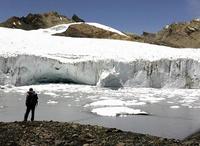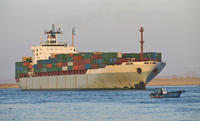-
Controversial nuclear reactor design moving toward approval
A controversial new nuclear reactor design is moving ahead for approval by the U.S. Nuclear Regulatory Commission (NRC); the chairman of the NRC announced that the agency would open the design for public comment before deciding whether to approve the reactor; critics of the proposed reactor, a Westinghouse AP1000, believe that in the event of an accident its safety measures are inadequate; if approved, the reactor could be used in as many as fourteen nuclear power plants
-
-
Melting glaciers threaten Peru

Rising temperatures have caused glaciers in Peru to melt at alarming rates; Peru depends heavily on rivers fed by glaciers to provide drinking water, irrigation, and electricity; some scientists estimate that in ten years, whole glaciers will disappear entirely from the Andes; millions of Peruvians depend entirely on the glacier fed rivers as their primary source for water; the United States fears that water, food, and power shortages in Peru could cause stability and spark conflict across the region
-
-
Counterterror laws hobble monitoring of water supplies
Laws designed to protect the U.S. water supply are making it difficult for communities to maintain proper oversight over water companies and their use of water; the DHS has evidence that al Qaeda was looking to disrupt or contaminate the U.S. water supply; environmentalists who are concerned over water shortages or resource usage are having difficulty obtaining any information; officials admit that the laws are clumsy and are currently reviewing a system to make more data publicly available while protecting sensitive information like the location of wells
-
-
Sector Report for Monday, 7 February 2011: Infrastructure protection
This report contains the following stories.
Plus 1 additional story.
-
-
Protecting vital infrastructure as sea levels rise
As the world gets warmer, sea levels are rising; it has been happening at a snail’s pace so far, but as it speeds up more and more low-lying coastal land will be lost; at risk are many of the world’s cities and huge areas of fertile farmland; the sea is set to rise a meter or more by the end of this century, swamping much vital infrastructure and displacing hundreds of millions of people; scientists are looking at various ways to slow down or reverse the rise in sea levels — and of ways of coping with its consequences
-
-
Asia faces climate-induced migration crisis
Asians accounted for 89 percent of the 207 million people affected by natural disasters globally last year; Asian governments are currently focused on mitigating weather changes induced by climate change, but a new report from the Asian Development Bank says they should start laying down policies and mechanisms to deal with the projected population shifts; weather changes such as significant temperature increases, changing rainfall patterns, greater monsoon variability, sea-level rise, floods, and more intense tropical cyclones would force millions of people to flee their homes to safer havens within countries and across borders
-
-
Egypt's Internet blackout revives U.S. "kill switch" debate
Egypt’s five-day shutdown of the Internet has revived debate in the United States over how much authority the U.S. president should have over the Web in the event of a crisis; a bill pending before Congress would give the president the authority to shut down parts of the Internet in the event of a national security crisis such as a sustained enemy cyberattack on the U.S. national grid or financial systems; critics say this is a threat to civil liberties; “It’s not an Internet kill switch,” says one cyber expert; “But you can think about isolating certain domains or certain enterprises; say a big power company gets infected— You say to them, ‘Disconnect yourself before you infect other power companies’; It’s like an avian flu quarantine for the Internet”
-
-
U.K. to impose hefty clean-up bill on nuclear power
U.K. energy and climate change minister Christopher Huhne last week made nuclear energy in the United Kingdom a whole lot less attractive; the liability for clean-up in case of a nuclear accident is currently limited to 140 million Pounds; the EU has proposed increasing this to 600 million Euros (507 million Pounds); Huhne wants to raise it to 1 billion Pounds (1.2 billion Euros).
-
-
Nearly half Bhutan's schools lack access to sufficient water
238 of Bhutan’s 576 schools lack sufficient water supplies; water shortages disrupt education as children must spend time that could be spent learning fetching water from streams; children are also falling sick due to poor hygiene and sanitation as a result of limited access to water; unsafe drinking water is one the second leading cause of death in the world and poses a serious public health risk to these children; water sources in Bhutan are dwindling as glaciers recede making it difficult to provide schools with water
-
-
New gene could help plants use less water
A mutant plant gene discovery by researchers at Purdue could lead to major breakthroughs in farming that would allow plants to be grown with less water without compromising growth; the mutant gene GTL1 reduces water loss without sacrificing carbon dioxide intake which usually affects growth negatively; tests show that the mutation reduced water loss by 20 percent; researchers are in the process of determining how this gene can be applied to crops
-
-
China's nuclear power expansion is based on thorium
The thorium fuel cycles produce almost no plutonium, and fewer higher-isotope residuals; thorium is much more abundant than uranium, and the reduced plutonium output eases proliferation concerns; the energy output per ton is also attractive; China has committed itself to establishing an entirely new nuclear energy program using thorium as a fuel; six heavy-water thorium reactors are planned in India, which has the world’s largest thorium deposits
-
-
Growing worries about security of Suez Canal

More than 35,000 ships crossed the Suez in 2009, about 10 percent of them oil tankers; if the Suez Canal were to close, oil tankers would be forced to sail around southern Africa — adding some 6,000 miles to the journey; this translates to an extra twelve days traveling from Saudi Arabia to Houston; based solely on speculation and risk, experts say the price of crude oil has gone up $5.00 a barrel since Friday; U.S. officials keep silent about how the United States might respond if Egyptian officials could no longer guarantee safe passage for the tens of thousands of ships that pass through the canal each year
-
-
Minnesota will see major floods in spring
Meteorologists project major floods in Minnesota this spring; emergency response officials warn that major roadways will likely be closed and are urging residents to immediately purchase flood insurance; officials are also encouraging residents to develop evacuation plans and to begin raising appliances off of basement floors; a third particularly rainy autumn followed by double the average amount of snow is to be blamed for the floods, as excessive snow melt will swell rivers in the spring; last year similar conditions caused rampant flooding and an estimated $28 million in damages
-
-
Offshore nuclear power plant safer against terrorists
Building nuclear power stations underwater could help protect them from terrorist attacks, according to a French company hoping to do just that; the plant would sit on the seafloor at a depth of 60 meters to 100 meters, a few kilometers off shore; the design would make the plant resistant to tsunamis, earthquakes, or floods, and its underwater position makes it less vulnerable to terrorist attacks
-
-
California dams plagued by seismic concerns
Half of Santa Clara County, California’s reservoirs cannot be filled to their full capacity due to seismic concerns; engineering tests revealed that in the event of a major earthquake the dam could slump sending a deadly tidal wave across densely populated communities; seismic retrofit costs to the county’s dam are estimated at $150 million; with the reduced capacity, the county’s dams must be maintained at 67 percent of its total capacity and cannot store more water in preparation for future droughts; the lost capacity could provide water for 280,000 people for a year
-
More headlines
The long view
Virtual Models Paving the Way for Advanced Nuclear Reactors
Computer models predict how reactors will behave, helping operators make decisions in real time. The digital twin technology using graph-neural networks may boost nuclear reactor efficiency and reliability.
